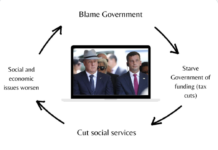The road to hell is paved with good intentions and Kainga Ora are hell bent on trying to take us to expensive unliveable cities that are poorly planned.
I agree with their vision that we must fix the affordable housing crisis; stop the loss of good farmlands to urban sprawl. And to do that we have to densify our cities around centres and along transport routes. This densification may(?) help shift the urban public away from a heavy reliance on private transport because it will or should increase the efficiency and viability of public transport. If this move to public transport happens that could reduce road congestion, and our dependence on oil. (Supposedly congestion in Auckland in 2017 cost NZ$2 Billion – p13 of the following report). So these changes could contribute towards reducing New Zealand’s carbon emissions and help us reach our climate targets to fight climate change.
So this is the good fight, the moral high ground is held and there is no reason to doubt (?). But for some reason Kainga Ora thinks this vision means destroying our historic built heritage; our green, intimate, inner city suburbs. The Kainga Ora good guy with the gun see’s only the evil demon NIMBY’S standing in the way. Kainga Ora’s strategy to deliver the vision is based on aggressively punching down on local communities, and local democracy.
And none of this conflict and destruction needs to happen to deliver their vision. The whole premise Kainga Ora are working from is flawed neo-liberal economics about giving permission as planning. For example, Peter Clough, Senior Economist with the Institute of Economic Research (not a group I share many views with) wrote a very interesting short paper ‘Four ways to improve climate change policy and why’, and made the following observation on housing densification.
The National Policy Statement on Urban Development, which enables high-density residential buildings around public transport arteries and nodes, has a logic in supporting alternatives to private car use along those corridors. But the subsequent legislative change to introduce medium-density residential standards that allow subdivision anywhere in residentially zoned areas on the initiative of private landholders risks the proliferation of intensified pockets scattered across city suburbs, still dependent on individual vehicle use for all journeys.
The city zone change permission to bully build up is not proper urban planning and has no identified mechanism to deliver affordable housing or deliver climate change benefits.
We also need to remember that private transport (cars) accounted for 8.7% of our gross carbon emissions in 2020, (Table 3 of same report). So the carbon gains to be made through housing are marginal under this non-densified bully build model. (Pull down wood to build in steel and concrete is not carbon neutral). Private transport carbon reductions are more effectively addressed by directly dealing with the type of cars being used and partially with public transport.
There is another private market feature of Kainga Ora that is undermining their ability to provide affordable housing. They have dual roles – providing social/affordable housing but also promoting the building of housing in general. Which means promoting the private market. So Kainga Ora are spearheading the push for up zoning changes to allow private developers to build very high in residential areas without regard to local communities.
This up-zone rule change is intended to stimulate the private market to build but that means Kainga Ora will be in a bidding war to get building supplies and resources to build affordable housing, driving up the cost to build affordable and slowing the delivery of affordable housing as scarce resources are tied up in private projects to maximise profit. So the dual purposes of Kainga Ora are actually in conflict and hampering the delivery of affordable housing. Consultant work that is used to justify a dual purpose is likely not very good, or perhaps it’s biased propaganda written by monkeys?
There is some very good proper academic research from Australia that shows the international trend to densify cities by a focus on simply allowing up-zoning (i.e. Build high buildings), has not lead to affordable housing.
The paper ‘We zoned for density and got higher house prices: Supply and price effects of upzoning over 20 years’. By Mark Limb, Cameron K. Murray is research based on Brisbane which has been using loose regulations for promoting affordable housing for years. The data shows these policies have failed. A few comments from the introduction of that paper put our own housing laws in context.
Globally, a broad alignment of academic, industry, and political support has formed into what is known as the YIMBY (Yes In My Backyard) movement, pursuing planning reform as the primary way to reduce home prices…. high density housing is allowed in areas that have traditionally had detached housing, while also promoting densification around urban retail and commercial clusters. …. This approach to planning higher-density cities has been pursued for over two decades in Australia, and is also common in North American and European cities. … Despite planning systems in many cities changing to permit much higher residential density, dwelling prices continue to rise and the property industry continues to call for further deregulation of land use planning in the name of housing affordability.
Kainga Ora is currently obsessed with NIMBY’s and zoning laws but the above paper shows these are not causing housing affordability problems. Kainga Ora is following the above failed neo-liberal economic strategy of promoting the private market. How gullible can they be? A profit maximisation market framework has not and does not provide affordable housing. In fact that framework creates/ed affordability problems. Yes, we need to build more affordable housing but that has to be done by, the government – Kainga Ora, or at least charities that are not profit driven.
The current market declines are not about increasing housing affordability through supply, they are about economic uncertainty, inflation and fears of recession. These declines do not bring affordability as they come with recession.
Kainga Ora delusions continue with wanting high rises in residential zones to have shops underneath; i.e. bringing the commercial into the residential. But denser cities are the other way round, they bring the residential into and above the central commercial zones/areas.
Kainga Ora are following the wrong policies and beating up the wrong people because they are uncritical of the economic framework in which the housing affordability crisis arose. They are indoctrinated to see the neo-liberal economic system as if it is wallpaper, or just a natural and logical system. It is not.
Kainga Ora, have very narrowly and incorrectly interpreted their role of promoting building private housing as being an obsessive focus on up-zoning changes. By contrast they could meet this role by simply inviting those owning commercial land to come forward for development opportunities. Many businesses may lack finance capital to develop their sites but may welcome having loads of potential customers living above their businesses. Developers could come forward and vie for sites; isn’t competition good?.
I assume Kainga Ora can use the Public Works Act to obtain sites for housing development. There are so many carparks or low use pieces of land in central cities that could be better used. Increased rates charges on commercial areas could help force businesses to negotiate. Less conflict is possible and the centre of cities would be developed where better infrastructure exists. Lower cost all round.
The problems of housing affordability lie outside the mechanisms of zoning and the nasty scapegoating of people as NIMBY’s. Kaniga Ora can be a positive and progressive force in developing our cities in a planned and productive manner. But have they got the courage to change course, to give free and frank public service advice to politicians? Have they got the guts to drop an absurd strategy that will not deliver their vision?





NZ political parties are pushing immigration levels that don’t allow for affordable housing. *crickets chirping*
Castro – Nailed it…far too many Kainga Ora properties are tenanted by recent arrivals to NZ…why do we need to import poverty into NZ at such high rates??
Is this true?
The import poverty part may well be true.
I needed to deposit $200,000 into a NZ bank to gain permanent residence in December 1999 on top of my experience and qualifications but by the time the paperwork was done in July 2000 the rule changes by the Clark government allowed me permanent residence based on my experience, qualification and ability to communicate in English.
Johan Thiart – sad, but true
The Canadians found that refugee immigrants, who are poor ,,,,, contribute more to the economy/society than ‘millionaire’ immigrants ,,,, and they don’t push/create housing affordability problems either.
https://www.cbc.ca/news/business/refugees-pay-more-income-tax-than-millionaire-investor-immigrants-1.2984982
Nz immigration is like 5 eyes and our Nato ‘partnership’ ,,, white/european..
Dawn raids and discrimination is for the darkies and ‘jungle people’
““Europe is a garden” but “most of the rest of the world is a jungle, and the jungle could invade the garden”.
https://www.aljazeera.com/opinions/2022/10/17/josep-borrell-eu-racist-gardener
B Awakesky – Other studies state refugees benefits are very limited
Stephen Minto’s solutions are always the same: much greater state control, directed by people he thinks should be charge, and who share his values.
It’s NIMBYism delivered through central planning committees, instead of heritage snd character planning permission overlays.
Hi Ada, It’s not about my ideas. I’m saying I agree with Kainga Ora’s vision but the strategy they are using to deliver it doesn’t fit the evidence as supplied by the research paper focused on Brisbane. The strategy Kainga Ora are using is prove to fail at delivering affordable housing. Read the paper – unfortunately the links to teh two papers I cite have not come through as I intended.
Unfortunately history shows – only governments have supplied affordable housing. (They can contract to build) That is not NYMBYism but fact.
Hi Stephen, one research paper doesn’t prove anything – no single paper could – and it has to be weighed against the vast amount of other research papers that point to freer consenting rules allows more housing to be built, and that the price paid depends on the relative supply and demand (im)balance, capacity to pay, expected future prices, etc.
I use the word NIMBY because your bottom-line goal appears to be the preservation of old homes and the character and amenity of old suburbs.
Nothing wrong with state control. No profit motive with state control, meaning more housing. The more profit people demand, the more rents are
The Labour Party enacted densification in our cities with support from their traditional National Party ally. Does that not say everything?
They did not need the support of National.
James Shaw “convinced” the National Party to support the Zero Carbon Act. Does that not say everything. James Shaw dragged Labour, kicking and screaming to the table. Yeah, right.
Just like 3Waters, Labour will push and pull, do whatever is required….. other than to argue and convince. Does that not say everything?
Kainga Ora is a job provider for people with degrees in social studies and genderwoo. It has not been a decent, or even just a mediocre housing provider for a long time.
morbid fear of state intervention in developers business and a terror of nimbys
Eke Panuku advises Megan Woods to deny a developer consent to build 5000 affordable homes in partnership with Kainga Ora!
How fucked up is this!?
https://i.stuff.co.nz/business/300852684/housing-standoff-escalates-as-developer-attacks-govt-red-tape-in-ad-campaign
as a result of nimbys complaining about property values tane? sincere question as I really don’t know.
Comments are closed.